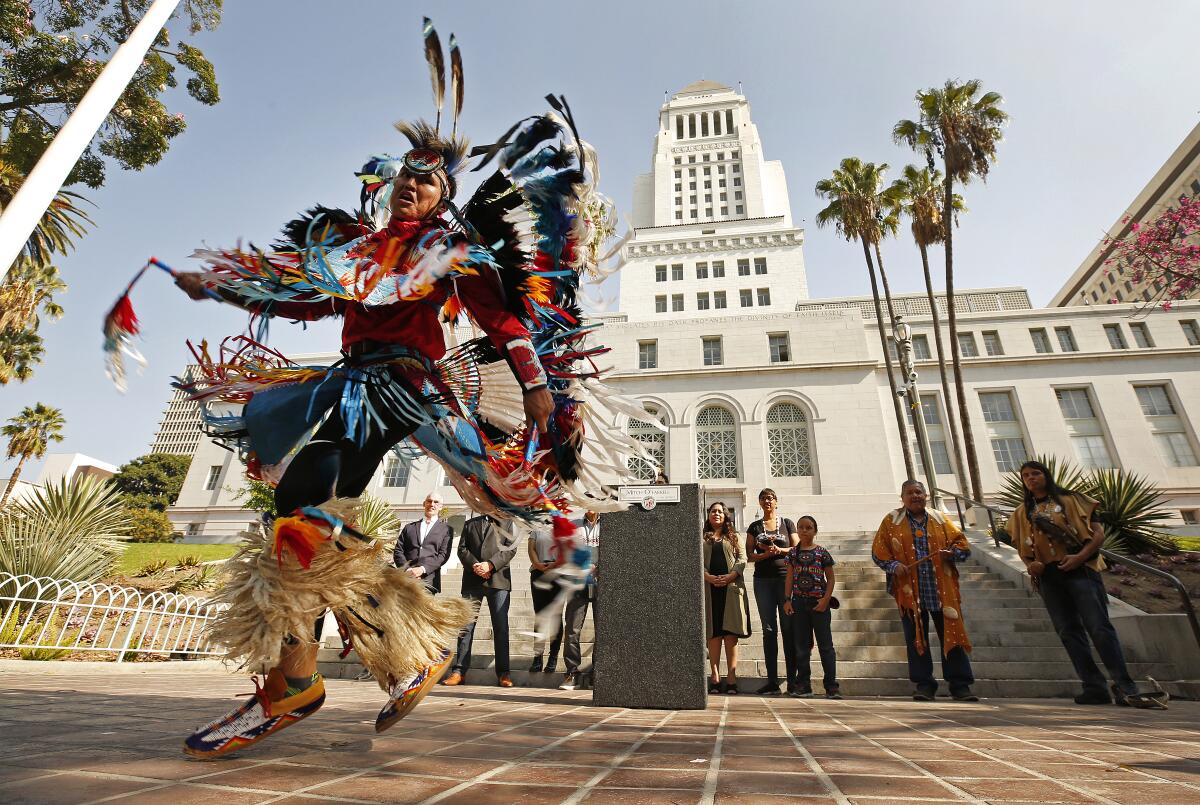Motion calls for Los Angeles to formally apologize to Indigenous communities

- Share via
Los Angeles should formally apologize to its Indigenous communities for decades of violence and mistreatment, according to a motion introduced Friday by City Councilman Mitch O’Farrell.
The motion, which was seconded by Councilman Marqueece Harris-Dawson, directs the city’s Civil and Human Rights Department to report on how the formal apology should be dispensed.
“The motion I introduced today is bold, and for good reason,” O’Farrell, a member of the Wyandotte Nation in Oklahoma, said in a statement. “The City of Los Angeles has never formally apologized for its treatment of the Indigenous Native American communities who originally inhabited this land.”
The motion also directs the city to report on its progress on its Civic Memory Working Group, which was impaneled by Los Angeles Mayor Eric Garcetti’s office to help develop ways to more accurately reflect the city’s history, as well as the implementation of portions of Assembly Bill 52 that relate to the city. The bill, which was approved by the California Legislature in 2014, requires that agencies consult with Native American tribes when undertaking projects that affect their cultural resources.
The Civil and Human Rights Department should also recommend policies to better serve Native Americans, the motion states.
“We can and must do better — not just in acknowledging our past, but in building a better future for Native communities in L.A.,” said O’Farrell, who represents an Echo Park-to-Hollywood district.
O’Farrell in 2017 worked with the Los Angeles City/County Native American Indian Commission to eliminate Columbus Day from the city calendar and replace it with Indigenous People’s Day.
Rudy Ortega, tribal president of the Fernandeño Tataviam Band of Mission Indians and former chair of the commission, thanked O’Farrell and praised his leadership.
“It is critical that Los Angeles lead the way in righting the wrongs committed against the first governments of this land,” Ortega said in a statement. “I look forward to seeing the City’s recommendations on how to better represent Native American communities in Los Angeles.
“We are the descendants of the original inhabitants of this land, and we are ready to move forward toward a more just and equitable future.”
The apology would be similar to one issued by Gov. Gavin Newsom on behalf of the state of California in 2019. Newsom wrote an executive order and also apologized in person during remarks at a blessing ceremony at the site of the future California Indian Heritage Center in West Sacramento.
“It’s called a genocide. That’s what it was. A genocide. [There’s] no other way to describe it, and that’s the way it needs to be described in the history books,” he said at the time.
California officials sought to exterminate Native Americans in the 1800s. In the Legislature’s first session in 1850, lawmakers approved an “Act for the Government and Protection of the Indians” that allowed Native Americans to be sold into indentured servitude for minor offenses and separated children from their families. The state spent the equivalent of more than $1 million in currency at the time to subsidize militia campaigns against the Native people, according to the governor’s office.
California’s Native American population declined from about 150,000 to 30,000 between 1846 and 1879, wrote Benjamin Madley, an assistant professor of history at UCLA, in a 2016 op-ed calling for the state to acknowledge the genocide.
Times staff writer Taryn Luna contributed to this report.
More to Read
Sign up for Essential California
The most important California stories and recommendations in your inbox every morning.
You may occasionally receive promotional content from the Los Angeles Times.











